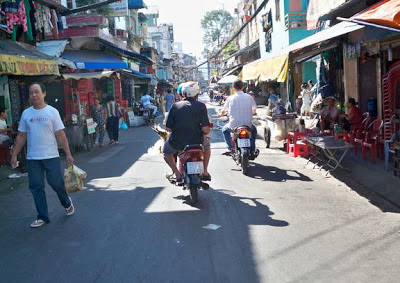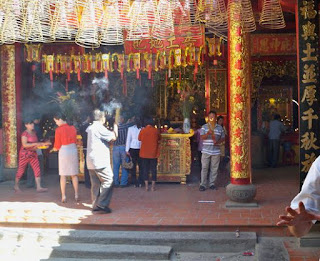During the last week of February, I went on a tour of HCMC with a couple visiting relatives of CIS staff. The tour was called 'Vietnam Vespa Adventures', and it is headquartered in a cafe in District 1 called the Zoom Cafe. You travel around the city on the back of a Vespa, driven by a Vietnamese driver. The idea is to get people off the crowded tourist trail and experience parts of the 'real' Saigon. I really enjoyed this tour. We left at 8:00 am and returned at 2:00 (after lunch at Zoom Cafe). Highly recommend this tour.

We started out at the 'bird park'. It works a bit like a dog park. People come from all over, by scooter, with their birds. Some bring many cages on 1 scooter. It is supposed to be good for the birds to socialize. I didn't see any women, so I asked the guide where they were. "They working." OK, without wanting to sound biased, but isn't that just typical. The men enjoy a morning at the park (with their birds) and the women are working, busy with jobs and family!!
This beautiful statue was erected to Buddhist monk Thich Quang Duc, who drove to the busy intersection across from this site, doused himself with gasoline and burned himself to death. He was protesting the treatment of Buddhists by the then Catholic government of South Vietnam under Diem. This happened in 1963, and the picture, taken by Malcolm Browne, won a pulitzer prize. Although Duc's act did result in reforms being developed, these reforms were never adopted and the treatment of Buddhists worsened until Diem's assassination in late 1963.
The large cauldron in the centre of the picture holds in incense sticks. Incense is burned to purify the surroundings, calm the mind, and as a gesture of respect. It is believed in Buddhism, that the smoke acts like a bridge to connect real life with the after life. By lighting incense, we are inviting our ancestors back to earth, to enjoy our offerings and to receive their blssings and protection.
 |
| On our way to the flower market. All the storefronts are open and you can buy all kinds of goods. |
 |
| Selling drinks from the back of a scooter. |

We weren't sure what these were, although they looked tasty. I've been told it is best to avoid street food, unless you are with a Vietnamese person who knows what you're getting.

Not many people have a clothes dryer (including us). So, clothes are hung on the balcony, or outside the window. Our apartment is fairly modern, so we have a drying room. It is like a balcony, but the whole wall is metal bars about 4 inches apart, allowing the air to pass through. There is a small storage room and another bathroom off the drying rooom.
 |
| Each flower had a protective cover. |
 |
 |
A stall in the flower market. Vietnamese people love flowers. There is a whole market devoted to just flowers.
Transport of bolts of cloth by scooter.
 |
| Cloth market |
The cloth market was mainly for wholesale purchases, but Vietnamese will sell to anyone, even in small amounts.
 |
| Cloth market |
 |
| Incense in the cauldron |
 |
| Cholon (District 5), coils of incense hang from the ceiling. |
 |
| Me with our guide. |
 |
| Cholon (China Town in HCMC) What you see on the alter are offerings to the ancestors and Buddha. |
We also went to a Buddhist pagoda and saw an actual service, which was fascinating. All the participants were wearing flowing black robes and the monks were in orange robes. You must remove your shoes in the alter chamber and your clothing should be modest: long pants and long sleeved shirts, however all the temples and pagodas I have visited were not too strict about dress. I think if you had spaghetti straps and short shorts, you would have been denied access.
 The Pagoda was narrow and several stories high. The third, fourth and fifth floors looked like a library (above). However, it is not books that are being stored - it is the ashes of the ancestors, all neatly labeled.
The Pagoda was narrow and several stories high. The third, fourth and fifth floors looked like a library (above). However, it is not books that are being stored - it is the ashes of the ancestors, all neatly labeled.  |
| Herb/medicine market in District 5. I didn't recognize anything! |
 |
| Me with my traveling companions, Malcom and Vera. Saigon River and District 1 in the background. |






No comments:
Post a Comment